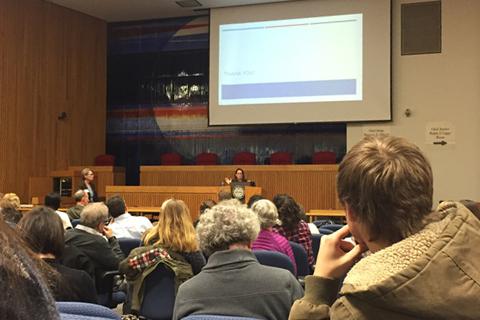Law professor underscores reproductive rights


Lois Shepherd, a law professor at the University of Virginia, gave a talk titled “How Reproductive Rights Have Failed Women and What to Do About It” in the Teplitz Memorial Moot Courtroom in Pitt’s Barco Law Building. (Photo courtesy of Laura Howe)
An older man in the audience of a reproductive rights lecture looked around the room and commented on the lack of people like him.
“You know, I think Rep. [Tim] Murphy summed up the whole problem, and that is men sort of abandon the issue or exclude themselves from the discussion until it immediately impacts them,” he said.
More than 100 people gathered in the Teplitz Memorial Moot Courtroom in the Barco Law Building to listen to Lois Shepherd, the presenter and a law professor at the University of Virginia, begin her talk about women’s reproductive rights, titled “How Reproductive Rights Have Failed Women and What to Do About It.”
Students on the undergraduate and graduate levels attended the event. Emma Hundertmark, a senior bioengineering major, said she had to attend two events for her bioethics class and was motivated to attend this lecture because she considers herself a feminist.
“Mostly I’m here to learn about how the past year of politics has affected everything. I’m not as up on the news as I probably should be, and I’m also really excited about the ‘what to do about it’ portion. I’d love to get involved in that,” she said.
Shepherd opened the lecture with an admission that she was going to address controversial topics, such as abortion, and clarified that she did not consider herself an expert on the subject of reproductive rights. Although she has written about health law and bioethics throughout her career, she said writing about abortion and reproductive rights in a scholarly context is not easy.
“It’s a bit intimidating to do so. Emotions can be high, passions can be divisive. It’s easy to mischaracterize a person’s position and assume a hostility towards a particular group, women or men or particular religious groups,” she said.
Shepherd said in recent years, the hostility has specifically been directed at women. She admitted there are certain ideologies entering the mainstream that she thought would never be part of the reproductive rights conversation in 2017, including poignant instances of prominent men insulting and blatantly misunderstanding instances of women’s health.
First came the Rush Limbaugh scandal in 2012, Shepherd said, in which he accused Georgetown law student Sandra Fluke — who advocated before Congress for contraception to be included in health insurance — of being a “slut” who was “having so much sex” she couldn’t afford contraception. Limbaugh said if taxpayers paid for Fluke’s contraception, they would in effect be “pimps.”
Rep. Todd Akin of Missouri appeared on live television later that year and criticized laws that made exceptions in abortion restrictions in cases of rape.
“From what I understand from doctors that’s really rare [for women to get pregnant from rape], if it’s a legitimate rape the female body has ways to try to shut that whole thing down,” he said in an interview.
Shepherd denounced his comments.
“So this was not only hugely ignorant … this whole idea of some rape is legitimate and some is not, it questioned women’s reporting of rape,” she said.
These were the instances that compelled Shepherd to enter the discussion of women’s reproductive rights. After doing so, she noticed how many abortion restrictions have arisen since the 1973 Roe v. Wade Supreme Court decision that legalized abortion. Since the case, 1,000 additional restrictions on abortion have been enacted — such as a ban on the dilation and evacuation method, which involves a surgical evacuation of the contents of the uterus — and 300 of them have been enacted since 2010.
Shepherd also discussed the rise of far-right hate websites, which have weighed in with their own thoughts on the role of women’s reproductive rights. She referenced a neo-Nazi website called The Daily Stormer, which launched a personal attack on Heather Heyer — who was killed by a car that intentionally ran into counter protesters of a Unite the Right rally in North Carolina.
The website, which denounced Heyer as “fat” and “a drain on society,” since she was childless at the age of 32, has since lost its domain and is inaccessible.
“This is some of the rhetoric that is happening now with respect to certain alt-right groups about women’s roles,” Shepherd said. “Is that really no great loss if she had died, if she was childless, if she wasn’t fulfilling her role of reproduction?”
Shepherd concluded her talk by pointing out language regarding abortion has focused on it being a choice rather than a right. In addition, the jurisdiction of choice is still given to the state and the physician rather than the woman.
After the lecture, Hundertmark said she thought it was informative and found it interesting when Shepherd explained the evolution of precedent surrounding what is legally considered abortion. But there were things she thought could’ve been improved.
“[The lecture was] a little more big picture than I was hoping. There wasn’t much ‘this is what you should go out and do today,’” Hundertmark said.
But Shepherd did give a few suggestions on what needed to be done to promote reproductive equality. Shepherd said there is a need to foster a retaliatory dialogue to combat those who see women’s roles in society as limited to being “sexual objects” or “reproductive conduits or mothers.”
“Right now I think there’s an outright public hostility toward women, and a significant platform for people who appear to hold women in low regard,” she said. “So now I think I need to start talking about this subject and so do a lot of other scholars in the mainstream.”
Recent Posts
Editorial | Pitt Administration must listen to its students’ electoral demands
The passing of these referendums does not guarantee a future Pitt with these policies. Merely,…
“Natural leader”: Blaire Bayless looks to showcase loyalty and talent in 2025
Blaire Bayless has always shown loyalty. It’s a trait about her that has never been…
‘We want the work and we like the work’: Pitt lacrosse takes down Liberty and anticipates the season ahead
Pitt women’s lacrosse took on Liberty at home at Highmark Stadium on Wednesday. Their 15-6…
Column | Pitt men’s basketball season was not decided by one call
There are five seconds left, and the game is tied at 54 a piece. Notre…
Column | Why the Mason Rudolph reunion is a great move for the Steelers
My, how the mighty have fallen. The Pittsburgh Steelers were the pinnacle of stability for…
Multiple families of trans kids denied gender-affirming medications at UPMC Children’s Hospital of Pittsburgh
Multiple families of transgender children said UPMC Children’s Hospital of Pittsburgh has denied access to…

